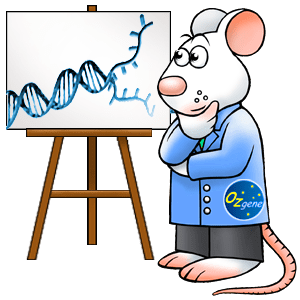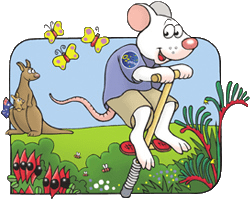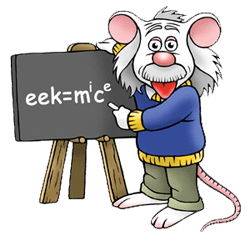Mastering Mutagenesis
Mastering Mutagenesis
In this issue
Feature
Australian Spring Special
Latest publications
Frank’s blog
Timeline update
 Mastering Mutagenesis
Mastering Mutagenesis
The world today is riddled with carcinogens and harmful mutagens ranging from the food we eat to the ever increasingly scorching sun rays. Environmental hazards seem to be all around us. How do these environmental influences actually change our DNA? How do our bodies respond to that change? These are all great questions and ones that are being studied worldwide as you read this.
Dr. Roger Woodgate and his team at the Laboratory of Genomic Integrity in the National Institute of Child Health and Human Development in Bethesda, Maryland have focused their careers on understanding the molecular mechanisms of damage-induced mutagenesis.
Under ideal conditions, the reliability of DNA replication is quite good. Approximately one error occurs in every 10 billion bases replicated. As one is continually subjected to a variety of endogenous and exogenous DNA damaging agents, optimal conditions rarely occur. Even though all organisms have evolved elaborate repair pathways to deal with such damage, these repair pathways never operate with 100% efficiency. As a consequence, the persisting DNA lesions are replicated, but with much lower fidelity than undamaged DNA.
The aim of Dr Woodgate’s research is to understand the molecular mechanisms by which mutations are introduced into damaged DNA and how it facilitates both evolution and species stability. This process is known as translesion DNA synthesis (TLS) and is facilitated by one, or more, of the “Y-family” of DNA polymerases that are conserved from bacteria to humans. These studies span the evolutionary spectrum and include studies in bacteria, archaea and eukaryotes, utilising yeast, human cells, and mouse models.
In addition to working on his important research, Dr Woodgate recently organised two Zing Conferences, one on DNA Polymerases in Cambridge, UK, and the other on Genomic Integrity in Cairns, Australia. The conference in Cairns focused on the various pathways that help protect living creatures from the genetic changes that lead to genomic instability, mutagenesis, inherited rare human diseases, cancer, premature ageing and neurological disorders. The next conference will be held in Dublin, Ireland, 9-12 July 2017. For more information closer to the date, please keep an eye on the Zing Conferences website.
Read more about Dr. Woodgate’s research, visit the Roger Woodgate lab website.
For more information on Ozgene mouse models, please see Ozgene services.
 It’s Spring in Australia!
It’s Spring in Australia!
What does that mean to you? It’s time for our annual Australian Spring Special. Save 10% on your KO or KI mouse models until the end of November. Contact us now for a confidential discussion on your projects.
Latest publications
Cytokine. 2015 Aug 18.
Borrelia-induced cytokine production is mediated by spleen tyrosine kinase (Syk) but is Dectin-1 and Dectin-2 independent.
Oosting M, Buffen K, Cheng SC, Verschueren IC, Koentgen F, van de Veerdonk FL, Netea MG, Joosten LA. – Radboud University Medical Centre, The Netherlands; Ozgene, Australia. [read]
Nat Med. 2015 Sep.
APP intracellular domain-WAVE1 pathway reduces amyloid-β production.
Ceglia I, Reitz C, Gresack J, Ahn JH, Bustos V, Bleck M, Zhang X, Martin G, Simon SM, Nairn AC, Greengard P, Kim Y. – The Rockefeller University, Columbia University, Yale University School of Medicine, USA; Ewha Womans University, South Korea. [read]
Cancer Cell. 2015 Aug 10.
The Inositol Polyphosphate 5-Phosphatase PIPP Regulates AKT1-Dependent Breast Cancer Growth and Metastasis.
Ooms LM, Binge LC, Davies EM, Rahman P, Conway JR, Gurung R, Ferguson DT, Papa A, Fedele CG, Vieusseux JL, Chai RC, Koentgen F, Price JT, Tiganis T, Timpson P, McLean CA, Mitchell CA. – Monash University, University of NSW, Ozgene, Alfred Hospital, Australia. [read]
Endocrinology. 2015 Aug 4.
Age-related hearing loss and degeneration of cochlear hair cells in mice lacking thyroid hormone receptor β1.
Ng L, Cordas E, Wu X, Vella KR, Hollenberg AN, Forrest D. – National Institutes of Health, Harvard Medical School, USA. [read]
 Ozgene’s Big History Project
Ozgene’s Big History Project
Frank’s blog – Lean ideology was introduced into the Ozgene culture back in 2009. At that time, we had several different departments within the company with set people to do each part. Each staff member had a “specialty”. Information was stored, but not analysed. Projects had become increasingly more complex and so had our processes. We were due for a change.


 Ozgene’s Big History Project
Ozgene’s Big History Project


